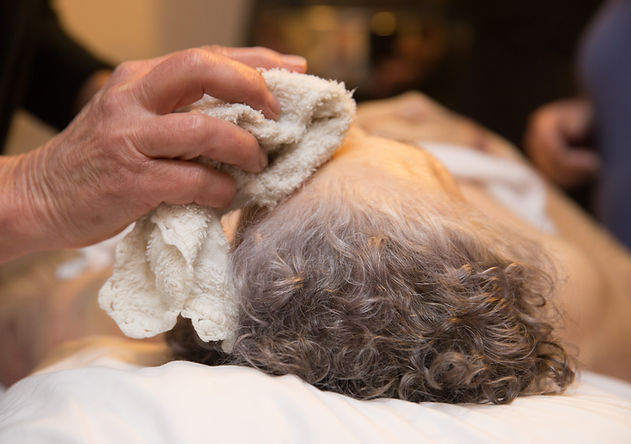
Intro to Home Funerals
In simple terms, a home funeral is where a family, community and/or executor of a person deceased stay involved in the arrangements and give care to their person as much or as little as possible. They choose where that person will be, who will assist them and ultimately set the direction and pace of how that journey will proceed.
Increasingly, our society is examining the contemporary methods of funeral and from that searching for a way that provides a more personal experience.
Below we've given a high level introduction to the topic. Should you have further questions, please get in touch.
What constitutes a home funeral?
A home funeral occurs when family, friends or community are involved with conducting any aspect or ritual in caring for a person’s body.
A home funeral is a safe, legal and empowering choice and occurs in the time between a person's death and the final disposition of their body. Participation in a home funeral can be as much or as little as any one person is comfortable with and prepared to do; this may include arranging or carrying out any, or all, of the following:
-
Spending time with the body
-
Washing and dressing
-
Cooling
-
Shrouding
-
Placing into a casket, coffin or shroud bearer
-
Creating and holding a funeral ceremony
-
Transportation
-
Obtaining permission where required
-
Completing and lodging legal paperwork
-
Cremation or burial
Any other associated activity desired or considered important.
The duration of a home funeral may be hours or days, and each one is unique.
Family, friends and/or community may choose to do everything themselves, with or without assistance from a funeral director or celebrant.
Home Funeral Image?


What can happen in the home?
Once at home (or indeed if you are allowed the time and space at the place of death), the family, community and/or executor are able to do what you feel is necessary to look after that person’s body. This can include washing, dressing or wrapping, encoffining a person and keeping them at home for several days. How long a person can be kept at home depends on the State. In NSW, for example, the deceased may stay at home for up to 5 days; in Tasmania, there is no prescribed length of time. General consensus in the home funeral movement suggests that depending on the climate and manner of death, 3-5 days is a reasonable time to keep a body at home without any outward signs of decomposition being present. Indeed, there have been various examples of people keeping their loved ones at home for longer periods without incident.
What are the practical concerns?
One important consideration when choosing to keep a person at home is the cooling of that person. It is necessary to maintain a cool room, free of direct sunlight where possible and to maintain a body temperature of 5 degrees Celsius or lower. This is possible and there are various options available that make this possible. The use of a cooling bed or blanket, a cuddle cot for a child, ice packs, dry ice, damp towels and/or Techniice (an Australian re-usable product) in conjunction with portable air conditioners to assist in keeping room temperature cool are all options available to Tasmanians. If this cool temperature is maintained, then you are not required to place the care of your loved one in the hands of a mortuary or into refrigeration.


Other processes and requirements
Taking time after a death in a more gentle and familiar surrounding also allows time for the organisation of the other more practical and legislative requirements and processes which are otherwise rather hurriedly done in a relatively short interview with a Funeral Director. Regardless of how you choose to handle the funeral, you will be required to:
-
Register the death with the Registry of Births, Deaths and Marriages.
-
Complete a Burial or Cremation Permit
-
Make a booking for either Burial or Cremation
-
Transport the body to the Burial or Cremation location
Some of this may require the input and assistance of a third party, such as a funeral home, depending on jurisdictional requirements. This is likely to be the case where an independent doctor is required to sign a cremation permit.

Choosing a home funeral allows for agency and autonomy in decision making and offers people a say in setting the course and pace that is taken when someone dies. A family, community and/or executor can have as much or as little input and control over what happens with their person and this has both financial benefits and also the opportunity for significant positive impacts on the grief and bereavement experiences of all involved.
